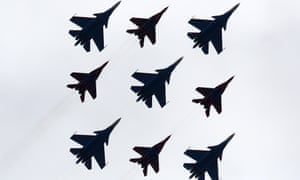Ewen MacAskill
 Britain’s defence chief of general staff, Sir Nick Carter, is to warn that the UK is trailing Russia in terms of defence spending and capability. Carter is to use a speech in London to enter publicly into the debate over defence spending, which military chiefs and Conservative MPs claim has dropped to dangerously low levels. Failure to keep up with Russia will leave the UK exposed, particularly to unorthodox, hybrid warfare of the kind practised by Russia and other potentially hostile states, according to Carter. One of the biggest threats posed is from cyber-attacks that target both the military and civilian life.
Britain’s defence chief of general staff, Sir Nick Carter, is to warn that the UK is trailing Russia in terms of defence spending and capability. Carter is to use a speech in London to enter publicly into the debate over defence spending, which military chiefs and Conservative MPs claim has dropped to dangerously low levels. Failure to keep up with Russia will leave the UK exposed, particularly to unorthodox, hybrid warfare of the kind practised by Russia and other potentially hostile states, according to Carter. One of the biggest threats posed is from cyber-attacks that target both the military and civilian life.
According to excerpts from the speech, Carter will say: “Our ability to pre-empt or respond to threats will be eroded if we don’t keep up with our adversaries.”
The Ministry of Defence is pressing the Treasury for a significant increase in spending on the army, navy and air force.
Hostile states, Carter will say, are being more creative in how they exploit the seams between peace and war. “We must take notice of what is going on around us or our ability to take action will be massively constrained. Speed of decision making, speed of deployment and modern capability are essential if we wish to provide realistic deterrence. The time to address these threats is now – we cannot afford to sit back.”
As well as Russia, North Korea, Iran and China have been blamed for cyber-attacks on the US and Europe.
Carter will accuse Russia of building an increasingly aggressive expeditionary force. Moscow, he will say, already boasts capabilities that the UK would struggle to match, pointing to Russian equipment used in Syria.
His speech comes amid a Cabinet Office review of national security, including both defence and the intelligence agencies. The Ministry of Defence believed it was facing brutal cuts, as the Cabinet Office focused mainly on the counter-terrorism threat and the work of the intelligence agencies and the Treasury hunted for more budget cuts.
Conservative MPs, backed by Labour MPs concerned about job losses in the defence industry, expressed vocal support for the MoD.
The government, bowing to this pressure, is to announce on Thursday that conventional defence is to be removed for budgetary purposes from the Cabinet Office review and instead there is to be a separate strategic defence review, even though the last one was only carried out two years ago.
The army, navy and airforce have been drastically cut back over the last decade. But much of this distortion is because so much of the defence budget is being channelled to the renewal of the Trident nuclear programme and two new aircraft carriers.
Although Russia is increasing its defence budget, this is still dwarfed by Nato spending overall. US president Donald Trump’s threats not to come to the aid of other Nato members has alarmed France, Germany, Italy, Spain and other European members who have taken some initial steps towards creation of a European defence force, especially in defence procurement.
The MoD has expressed scepticism about the prospect of a European defence force and remains committed to Nato.
Few, if any, US or western European military chiefs believe an invasion of the Baltic states or elsewhere in eastern Europe by Russia is likely in the near future. But there is concern about Russia’s increasing ability to create disruption through cyber-warfare, propaganda and other means and its increased involvement in the Middle East.
“State-based competition is now being employed in more novel and increasingly integrated ways and we must be ready to deal with them. The threats we face are not thousands of miles away but are now on Europe’s doorstep – we have seen how cyber-warfare can be both waged on the battlefield and to disrupt normal people’s lives – we in the UK are not immune from that,” Carter will say.
Cyber-warfare is the responsibility of both the UK surveillance agency GCHQ and the MoD.
Theresa May, speaking at the lord mayor’s banquet in November, accused Russia of meddling in elections and planting fake stories in the media in its attempts to “weaponise information” and sow discord in the west
No comments:
Post a Comment